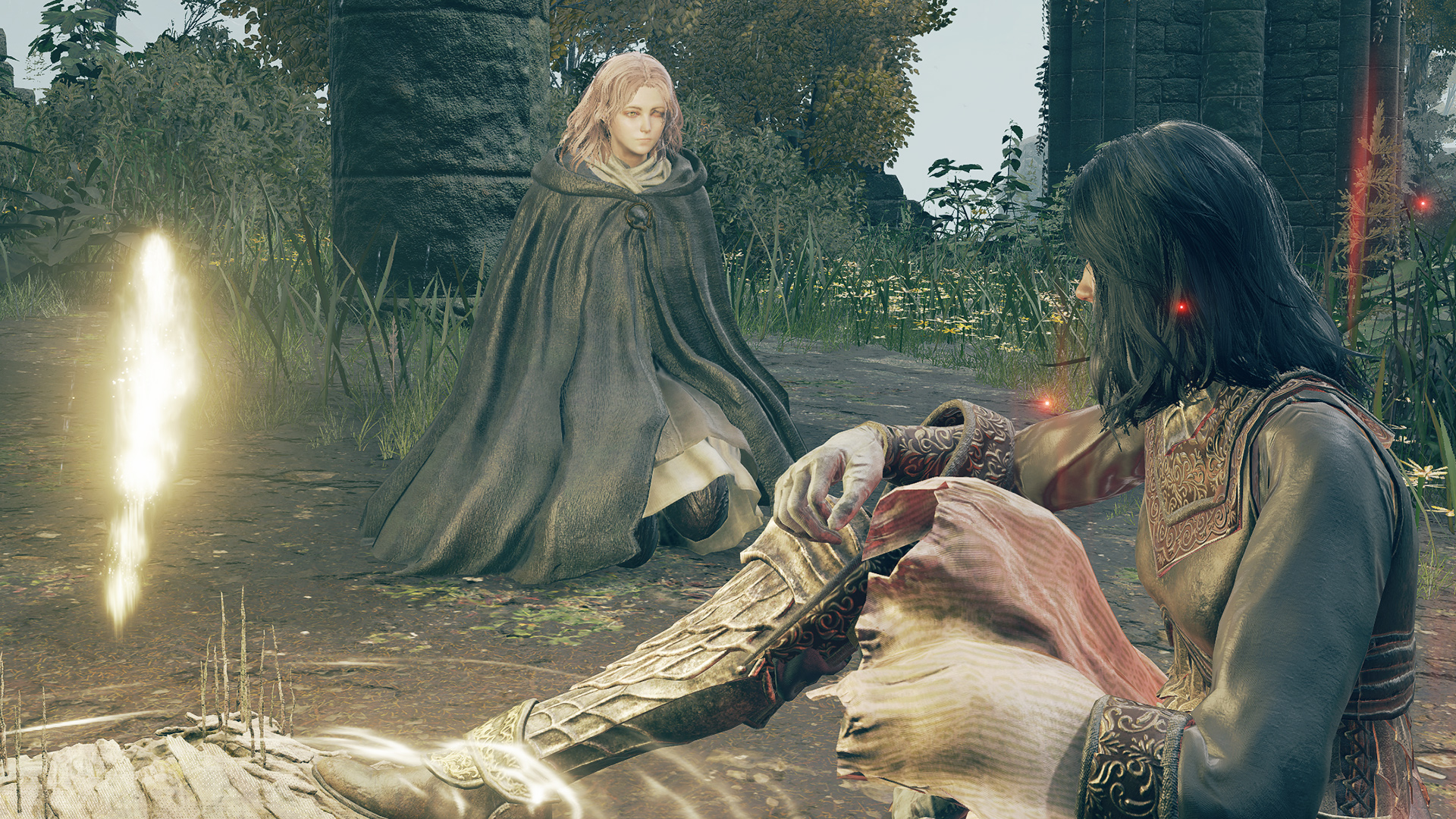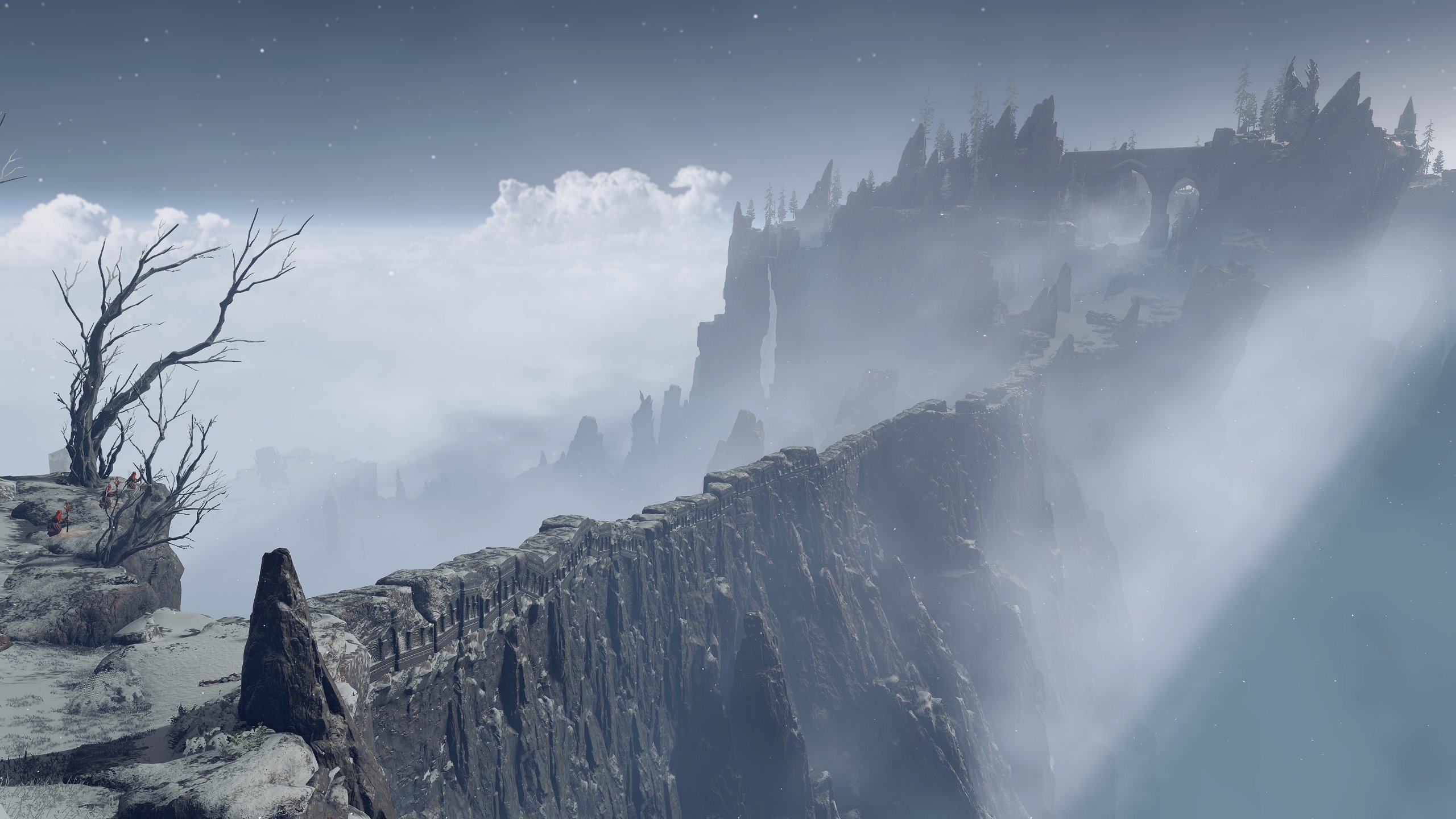Elden Ring is the new Skyrim
FromSoftware's fantasy epic is the blueprint for our open world future.

A group of developers who previously worked on some of the most monumental open world games of the last 15 years are trying to make their next one more like Elden Ring. FromSoftware's unique action-RPGs have had a strong grip on the games industry since 2011's Dark Souls, but Elden Ring's massive success is the start of a new wave of projects inspired by its staggeringly creative open world design.
Jeff Gardiner, who previously worked as a producer on Skyrim, Fallout 4, and Fallout: 76, told PC Gamer that Elden Ring was a "huge inspiration" for its new game Wyrdsong, which was announced at Gamescom last week. He said he wasn't interested in FromSoftware's Souls games at first, but eventually came around when he realized that it's not a series about punishing the player, but about rewarding patience instead.
Any long-time Souls fan knows what Gardiner means. The Souls series (including Bloodborne and Sekiro) are difficult games. Skirmishes with the weakest enemies can send your flayed corpse back to a checkpoint for the smallest of errors; the deliberate combat demands you to respect every encounter, no matter how easy it might initially look. But they're also games where that hostility fades the longer you play, and the design ethos then starts to take shape. All of the puzzle pieces are there, you just need to take the time to learn how they fit together.
FromSoftware's games are built on a fundamental principle that all of their marketing and their dubiously hostile fans can't articulate: they want you to finish them.
Elden Ring is the new Skyrim, gaming's go-to massive fantasy playground.
Elden Ring is the clearest refinement of that core principle, and the most approachable Souls game because its open world structure allows the developer to ease you into learning the language the series has been speaking for the past 13 years. From your first step into The Lands Between you have so many directions to go in the world, with your character, with the story, and with your approach to combat; you're given the space to learn the game in the most comfortable way for you. This has always been the underlying thesis to Souls, but Elden Ring's scale, and the gradual difficulty curve that comes with it, makes it more legible than ever before.
Elden Ring is the new Skyrim, gaming's go-to massive fantasy playground. You're a little character in a big world where you stumble into a bunch of gods and monsters that don't think you should be there. Despite gaming's obsession with selling skins and battle passes right now, Elden Ring is a game that only wants you to pay attention and share that experience with others online. Obviously Elden Ring owes Skyrim for cultivating the framework for this particular sort of fantasy epic and the rampant desire it cultivated for open world games that let you off the leash—it wouldn't have hit the same way without Skyrim blazing that trail.
But now it's FromSoftware's turn to take the lead.
Keep up to date with the most important stories and the best deals, as picked by the PC Gamer team.

Our Soulslike future
It's been clear for years that FromSoftware's games aren't just a "niche," but even still Skyrim seems like the more "mainstream," widely popular game. But Elden Ring really is Skyrim Big: Bethesda's RPG sold 20 million copies in its first two years of life, while Elden Ring is already at the 17 million mark after six months. It took The Witcher 3 about a year to sell 10 million copies. With this kind of success, Elden Ring and FromSoftware's general creative blueprint will be a major inspiration for many game designers in the future, whether they aspire to literally imitate its systems or design open worlds that step back and let you find your path through them.
Souls games, and Elden Ring especially, hinge on spaces that are designed to lead your eye. They're meticulously crafted to pull you in some direction, whether it's safe or not. Tough enemies, valuable items, and stunning vistas are tucked into the game world waiting for you to find. Quest objectives and markers don't exist in the framework of a Souls game; you set every goal and chase it until something intercepts you.
Everything else that's so endearing about Souls games trickles down from there. They are games that can't be weighed down by endless experience bars, talent trees, or the many other ways modern RPGs like to remind you that you're gaining power and progressing through the game. Souls games are full of stats and upgrades, but the order and speed you accumulate power depends entirely on your path through the game. Prior open world games like Skyrim, Assassin's Creed: Valhalla, and even Genshin Impact gate entire areas with tough enemies or will scale their difficulty up as you level to maintain a challenge.
Elden Ring's extremely player-driven experience is something open world games have lost.
Parts of Elden Ring vary in difficulty too, but it's largely dependent on what sort of character you've built. An early game spellcaster can sweep through Stormveil Castle where a greatsword wielder can't, but in Raya Lucaria, where the sorcerer enemies buckle against aggressive melee attackers, the sword user will come out on top. This open approach, with almost no restrictions, is why people have managed to beat Elden Ring with one hand or in under four minutes.
That extremely player-driven experience is something open world games have lost as publishers found it much easier to mutate them into service games where much of the direction is given to you. The modern open world game isn't an adventure—it's a treadmill. Open world games sprinkle useful abilities and stunning armor just outside of your reach. Assassin's Creed: Odyssey requires you to repeatedly invest points in a talent tree to be able to fully eliminate an enemy with a surprise attack from the shadows, a technique that you'd think would be mastered by a character in a series about assassins.
Even Halo Infinite doesn't let you repeatedly use its single best tool, the Grappleshot, until you upgrade it. Open world games hold their strongest parts back until you earn them, replacing the thrill of engaging with well-designed systems with the anticipation of eventually doing that. This year's Dying Light 2 is another prime example. Open world games are about getting dazzled by a restaurant menu, picking out what you want to order and waiting—sometimes 20-30 hours—for the meal to arrive.

Elden Ring is a reminder that people are inherently curious and you can design a game to nurture a motivation as simple as that, and then do almost anything with it. Open world games don't need to track all of the NPCs you've talked to; if they're interesting, you'll remember them. Combat encounters don't need to be mindless friction before tougher enemies show up; every fight can challenge your familiarity with the rhythm of battle and offer clever players ways to subvert it. And their worlds don't need to explain themselves through dialogue and journal entries alone: characters and environmental design can flesh out the world too.
Elden Ring will hopefully spark designers to favor more moments where you stumble into the devastatingly powerful Sword of Night and Flame instead of spending a hundred hours working up to something of similar power at the end of a skill tree. Open world games would benefit from giving you room to have influence over the world, separated from the constraints of where the play-tested path wants you to be. Even the mighty Sword of Night and Flame wasn't an easy solution for Elden Ring's hardest boss. Considered open world design lets you have your fun discovering something that feels like you shouldn't have it yet, and incorporates that into the broader construction of the game.
Even if Elden Ring's influence works its way into some of the inevitable sequels and remakes that get the green light every year, one big success might convince those publishers that trading on purely familiar features isn't the only way to grab people's attention—that we're all ready to be broken out of our routines and taught something new, even if we don't know it.
Oh, Elden Ring
Once you spend enough time in a FromSoftware game, it ruins everything else. This is why Souls fans are annoying about their love for the developer's games. All of my friends have come to accept I will never stop talking about how prescient the item description of Dark Souls 2's Dull Ember is—if you know, you know. Over 17 million people have bought Elden Ring, with a surprising 50% of PC players making it to the mid-way point of the game. And even if you didn't make it that far, all of the discussions and memes that surrounded its release helped unearth what FromSoftware's persistent fans have been drooling over for years. Finally, it feels like everyone is on the same page.
FromSoftware has widened the genre it created and sent it soaring out into culture outside of gaming.
Right now gaming and popular media at large are inundated with remakes, remasters, and retreads. Elden Ring itself might be a recontextualization of what FromSoftware has been doing since Demon's Souls (which pulls from games like Zelda), and inevitably it'll spawn some derivative works. But it's an invitation—maybe a challenge—for other creators to push a little harder, dream a little bigger.
FromSoftware has widened the genre it created and sent it soaring out into culture outside of gaming. Its impact on social media, especially TikTok and YouTube, is seared into the memories of far more people than Dark Souls ever was. Elden Ring isn't only a tremendous game; it's a moment in pop culture that grabbed the attention of millions of people, people who will want to play more games like it and who might go on to make things inspired by it.
The games that follow Elden Ring will continue its argument for making worlds that require unraveling, where dream logic and characterization aren't spelled out in a quest log, and where the developer's imagination blends with yours.
Tyler has covered videogames and PC hardware for 15 years. He regularly spends time playing and reporting on games like Diablo 4, Elden Ring, Overwatch 2, and Final Fantasy 14. While his specialty is in action RPGs and MMOs, he's driven to cover all sorts of games whether they're broken, beautiful, or bizarre.

